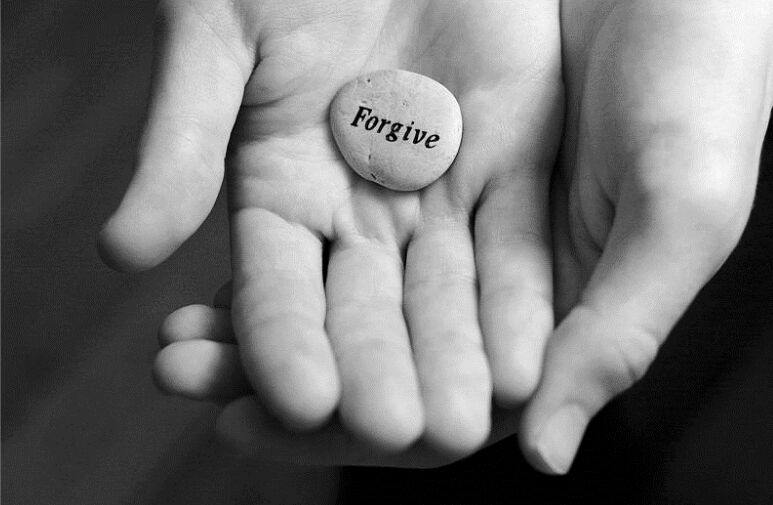Subscribe To Our Newsletter
Subscribe to our newsletter and receive free educational articles and videos each month.
Main Menu
Forgiveness
Psychologists generally define forgiveness as a conscious, deliberate decision to release feelings of resentment or vengeance toward a person or group who has harmed you, regardless of whether they actually deserve your forgiveness. Forgiveness does not mean forgetting, nor does it mean condoning or excusing offenses. (Source: www.greatergood.berkeley.edu)

We’ve all been hurt by someone and more often than not, by a loved one. Unfortunately, too often we allow our hurt to debilitate us. We may think our unwillingness to forgive punishes our offender, but unfortunately, we often end up hurting the most. When we hold onto a hurt, it often becomes a hate! Yet, forgiveness can bring the forgiver peace of mind and free him or her from corrosive anger.
A business friend, Mark, shared his personal story with me two months after the death of my son Chris in September 2017. “Chad, several years ago I lost my wife and best friend on the very same day.” “No way, what happened?”, I exclaimed. “I found out that my wife and best friend were having an affair”, Mark explained. “It was devastating for me and the only thing I could do to survive was to journal regularly about my grief. Finally, after five years, I was able to meet with my ex-wife to tell her that I forgave her. When I walked away from our meeting, a huge weight was lifted from me. I felt a sense of freedom. Within two months of me forgiving, I met my wife of today and together we share an amazing son!” Mark revealed his story after I told him how therapeutic it was for me to write about Chris and share with others. Mark understood the importance of reflecting on one’s own grief and I really valued learning about his story of forgiveness.
At Chris’ funeral, I shared my prayer that by people reflecting on my son’s death, broken relationships would somehow be restored between God and us, his children, and between individuals. It breaks my heart when I see family members or friends not talking to one another because of some offense that occurred or was perceived to have occurred. Since Chris’ passing, I have often thought to myself: “Come on, your child (or parent, sibling, friend, etc.) is still alive, and my son is dead! Yet, you have the opportunity to be reconciled with your loved one. Is the reason for your broken relationship really that extreme that you treat one another as if you were physically dead?” Even if you and your loved one can’t be reconciled now, please understand the power and importance of forgiveness.
For most of my generation, we remember reciting the Lord’s Prayer many mornings at school. I believe our lives could be greatly improved if we followed the words in that prayer on forgiveness:
“Forgive us our sins (debts), as we have forgiven those (debtors) who sin against us.” Mathew 6:12 (NLT)
I believe the above verse is as true as gravity. How can I expect my wife Rose Mary to forgive me when I don’t forgive her? Why should I expect anyone to forgive me when I am unwilling to forgive others? We all want to be forgiven when we mess up, yet we often find it so difficult to forgive others when they have hurt us. Why? I know I personally judge myself based on my intentions, yet I judge others based on their actions. It’s a shame that I often give myself more grace than I do others.
I had lunch with Mark again in May 2019 and received his permission to share his story publicly. Mark confirmed that he had a huge amount of venom coming out of him during his 5 years of grief and he wasn’t always proud of the way he treated others. “Chad, it was amazing how the venom seemed to disappear within minutes after I forgave my ex-wife and I know now that I wasn’t able to truly fall in love again until I forgave!”
Mark, thank you for being vulnerable as your sharing has helped me and I hope it will help others.
Subscribe To Our Newsletter
Subscribe to our newsletter and receive free educational articles and videos each month.
Forgiveness
Psychologists generally define forgiveness as a conscious, deliberate decision to release feelings of resentment or vengeance toward a person or group who has harmed you, regardless of whether they actually deserve your forgiveness. Forgiveness does not mean forgetting, nor does it mean condoning or excusing offenses. (Source: www.greatergood.berkeley.edu)

We’ve all been hurt by someone and more often than not, by a loved one. Unfortunately, too often we allow our hurt to debilitate us. We may think our unwillingness to forgive punishes our offender, but unfortunately, we often end up hurting the most. When we hold onto a hurt, it often becomes a hate! Yet, forgiveness can bring the forgiver peace of mind and free him or her from corrosive anger.
A business friend, Mark, shared his personal story with me two months after the death of my son Chris in September 2017. “Chad, several years ago I lost my wife and best friend on the very same day.” “No way, what happened?”, I exclaimed. “I found out that my wife and best friend were having an affair”, Mark explained. “It was devastating for me and the only thing I could do to survive was to journal regularly about my grief. Finally, after five years, I was able to meet with my ex-wife to tell her that I forgave her. When I walked away from our meeting, a huge weight was lifted from me. I felt a sense of freedom. Within two months of me forgiving, I met my wife of today and together we share an amazing son!” Mark revealed his story after I told him how therapeutic it was for me to write about Chris and share with others. Mark understood the importance of reflecting on one’s own grief and I really valued learning about his story of forgiveness.
At Chris’ funeral, I shared my prayer that by people reflecting on my son’s death, broken relationships would somehow be restored between God and us, his children, and between individuals. It breaks my heart when I see family members or friends not talking to one another because of some offense that occurred or was perceived to have occurred. Since Chris’ passing, I have often thought to myself: “Come on, your child (or parent, sibling, friend, etc.) is still alive, and my son is dead! Yet, you have the opportunity to be reconciled with your loved one. Is the reason for your broken relationship really that extreme that you treat one another as if you were physically dead?” Even if you and your loved one can’t be reconciled now, please understand the power and importance of forgiveness.
For most of my generation, we remember reciting the Lord’s Prayer many mornings at school. I believe our lives could be greatly improved if we followed the words in that prayer on forgiveness:
“Forgive us our sins (debts), as we have forgiven those (debtors) who sin against us.” Mathew 6:12 (NLT)
I believe the above verse is as true as gravity. How can I expect my wife Rose Mary to forgive me when I don’t forgive her? Why should I expect anyone to forgive me when I am unwilling to forgive others? We all want to be forgiven when we mess up, yet we often find it so difficult to forgive others when they have hurt us. Why? I know I personally judge myself based on my intentions, yet I judge others based on their actions. It’s a shame that I often give myself more grace than I do others.
I had lunch with Mark again in May 2019 and received his permission to share his story publicly. Mark confirmed that he had a huge amount of venom coming out of him during his 5 years of grief and he wasn’t always proud of the way he treated others. “Chad, it was amazing how the venom seemed to disappear within minutes after I forgave my ex-wife and I know now that I wasn’t able to truly fall in love again until I forgave!”
Mark, thank you for being vulnerable as your sharing has helped me and I hope it will help others.

